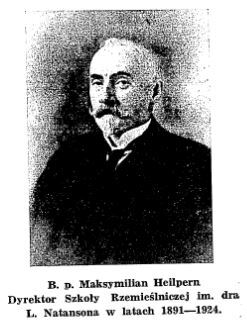Maximilian Heilpern was born in 1856 into a family of Jewish merchants who repeatedly gave evidence of Polish patriotism. His elder brothers took part in the January Uprising against Tsarist Russia, and one of them, Izydor, was an aide-de-camp to General Marian Langiewicz, one of the Uprising’s leaders. His son, Bronisław died at the front of the First World War as a soldier in Józef Piłsudski’s Legions.
From 1876, Maximilian studied veterinary medicine at the University of Warsaw. At the same time, he became involved in secret activities in the Society for National Education. The organisation, influenced by the positivists, was concerned with spreading education in rural areas. Heilpern propagated the ideas of self-education popular in this milieu. He later became interested in socialism, seeing in it an opportunity to solve many of the pressing problems of the poorer citizens of the Kingdom of Poland. In 1877, Heilpern became a member of the International Socialist-Revolutionary Party Proletariat.
His involvement in socialist activity led to his arrest by the Russian authorities and imprisonment in the Warsaw Citadel. He served his prison sentence from 1879 to 1881, during which time he took up editing the manuscript newspaper Voice of the Prisoner. He was eventually exiled to Siberia (1881-1884).
In exile, like other prominent Polish intellectuals, Heilpern took up scientific work. In his case, it was botanical research of Siberia. On his return, he re-entered the university to complete his studies. During this time, he worked as a teacher in private schools, obtaining a patent as a home teacher. However, at the same time, he was active in the illegal Flying University, for which the tsarist authorities revoked his teaching licence.
Despite this, he managed to return to his profession. He succeeded as a teacher in Dr Ludwik Natanson’s craftsmen’s workshop, which had been transformed into a craftsmen’s school for the Jewish community in Warsaw. He quite quickly became its director.
When Poland regained its independence, Heilpern was regarded as an outstanding expert on vocational education, so in 1918 he was asked by the Ministry of Education to write a study on the subject. He also evaluated textbooks for students of vocational training institutions and wrote them himself.
In free Poland, he did not abandon his educational and popularisation activities. He was the author of many books on natural sciences. In addition, he wrote one of the chapters of the book “History of the Jewish Community in Warsaw in the 19th century”, devoted to the communal crafts school, where he was director until his death.
Heilpern died in 1924. The eulogy at his funeral was delivered by the Minister of Education, Bolesław Miklaszewski.





